Social Links Widget
Click here to edit the Social Media Links settings. This text will not be visible on the front end.
A Recession Does Not Equal a Housing Crisis [INFOGRAPHIC]
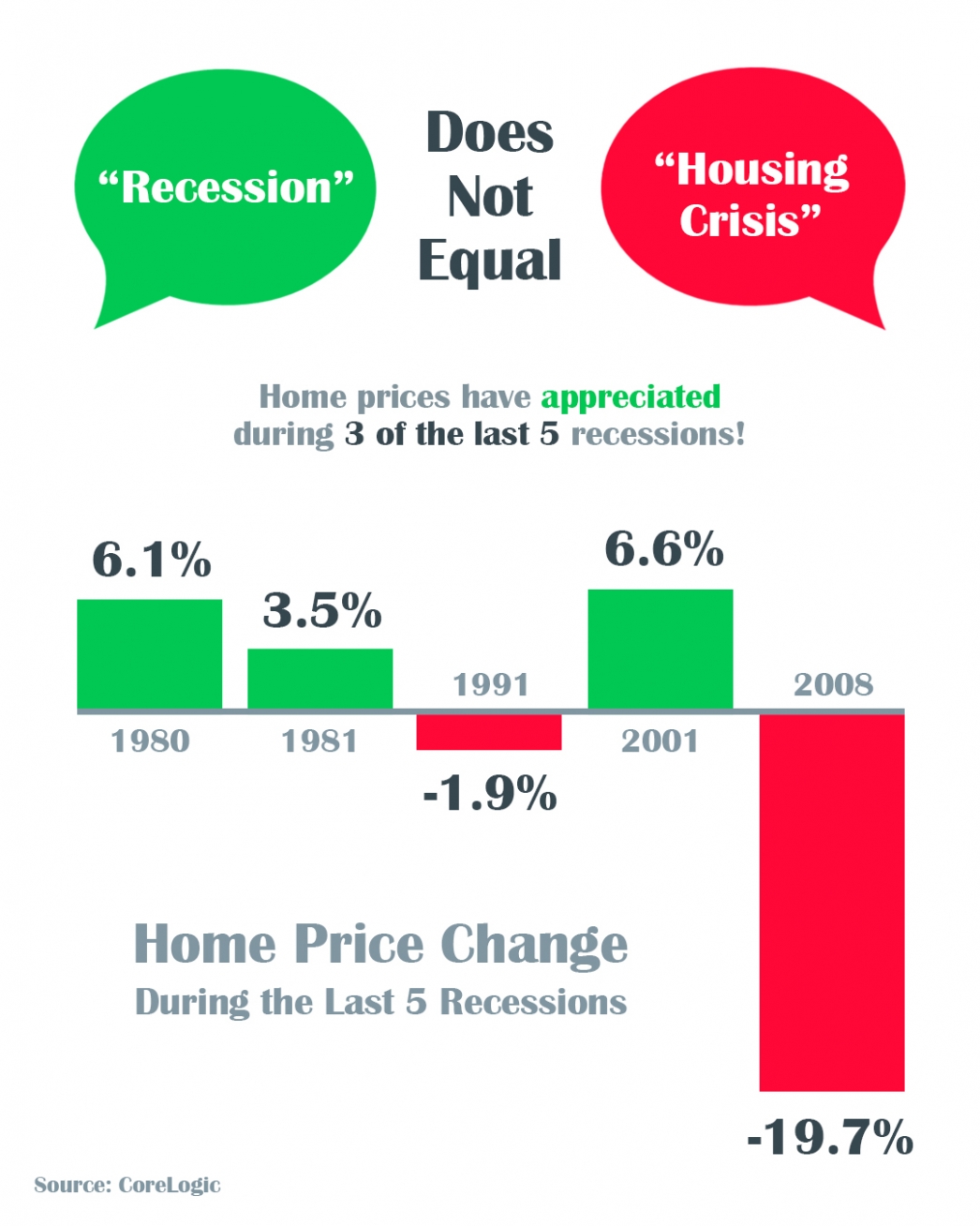

Some Highlights
- The COVID-19 pandemic is causing an economic slowdown.
- The good news is, home values actually increased in 3 of the last 5 U.S. recessions and decreased by less than 2% in the 4th.
- All things considered, an economic slowdown does not equal a housing crisis, and this will not be a repeat of 2008.
Should I wait???
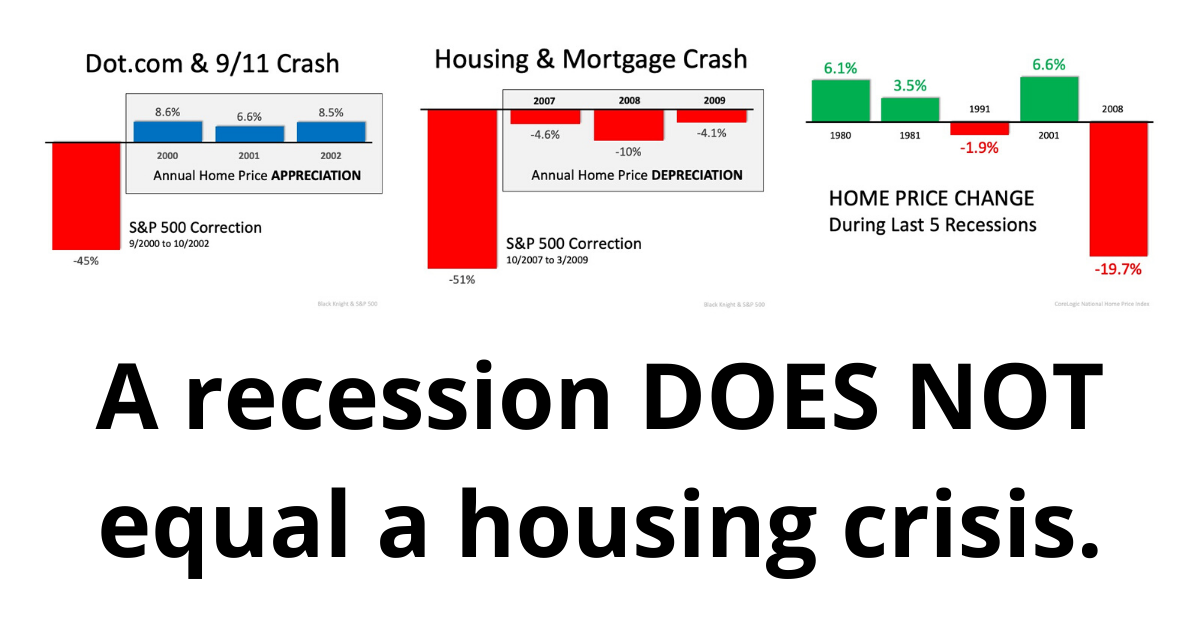
With everything that is happening in the US and around the world related to COVID-19, many people are wondering, “Should I wait?”… should I wait to sell my home, should I wait to buy a home? There are still many people listing homes for sale and buyers still looking for those homes. Yes, we’ve had to stop all home tours but we’re creative people and there are great resources out there to help like 3D video tours, photos, FaceTime, Zoom meetings, Docusign, eRecording for the county and all sorts of workarounds.
A recession does not equal a housing crisis or “crash” as we saw in 2008.
9/11 has a lot in common with what is happening today. People are avoiding crowds and the same part of the economy is under pressure, restaurants, airlines, hotels, bars, and so on.
If you take a look at the related graph, you see that during the DOT com scare and after the 9/11 terrorism attacks, the stock market showed volatility like we’re seeing today. However, the housing market wasn’t affected, and home prices actually appreciated.

A great analogy was presented to me, 2008 was like a tornado that ripped through and shredded everything and we had to rebuild. All the systems we counted on in banking, mortgage, lending were demolished and it effected everyone. The COVID-19 is more like a giant snowstorm that has hit and we’re all stuck inside. But eventually, it will clear and we will be able to get back out to go about our regular lives… to work, to travel, to our favorite restaurant or bar, movies or theater, and our kids will go back to school. While we may not know what the future holds if you are pausing on buying OR selling a home because you think a recession will cause another housing crisis… they’re not the same thing, and you could be missing out on today’s record-low mortgage rates. Which are still HISTORICALLY low.
Are you thinking about selling your home to move into the right size home for your family? Or ready to downsize to fit your current needs? Do you have questions about selling your home in this market? Give me a call today at 408-465-9290 or DM me to go over your real estate goals.
Buying a Home: Do You Know the Lingo? [INFOGRAPHIC]
![Buying a Home: Do You Know the Lingo? [INFOGRAPHIC] | MyKCM](https://desireestanley.com/files/2020/03/20200313-MEM-EN-1046x1308.jpg)
![Buying a Home: Do You Know the Lingo? [INFOGRAPHIC] | MyKCM](https://files.mykcm.com/2020/03/09122748/20200313-MEM-EN-1046x1308.jpg)
Highlights:
- Buying a home can be intimidating if you’re not familiar with the terms used throughout the process.
- To point you in the right direction, here’s a list of some of the most common language you’ll hear along the way.
- The best way to ensure your home buying process is a positive one is to find a real estate professional who will guide you through every aspect of the transaction with ‘the heart of a teacher.’
Two Big Myths in the Home buying Process


The 2020 Millennial Home Buyer Report shows how this generation is not really any different from previous ones when it comes to homeownership goals:
“The majority of millennials not only want to own a home, but 84% of millennials in 2019 considered it a major part of the American Dream.”
Unfortunately, the myths surrounding the barriers to homeownership – especially those related to down payments and FICO® scores – might be keeping many buyers out of the arena. The piece also reveals:
“Millennials have to navigate a lot of obstacles to be able to own a home. According to our 2020 survey, saving for a down payment is the biggest barrier for 50% of millennials.”
Millennial or not, unpacking two of the biggest myths that may be standing in the way of homeownership among all generations is a great place to start the debunking process.
Myth #1: “I Need a 20% Down Payment”
Many buyers often overestimate what they need to qualify for a home loan. According to the same article:
“A down payment of 20% for a home of that price [$210,000] would be about $42,000; only about 30% of the millennials in our survey have enough in savings to cover that, not to mention the additional closing costs.”
While many potential buyers still think they need to put at least 20% down for the home of their dreams, they often don’t realize how many assistance programs are available with as little as 3% down. With a bit of research, many renters may be able to enter the housing market sooner than they ever imagined.
Myth #2: “I Need a 780 FICO® Score or Higher”
In addition to down payments, buyers are also often confused about the FICO® score it takes to qualify for a mortgage, believing they need a credit score of 780 or higher.
Ellie Mae’s latest Origination Insight Report, which focuses on recently closed (approved) loans, shows the truth is, over 50% of approved loans were granted with a FICO® score below 750 (see graph below):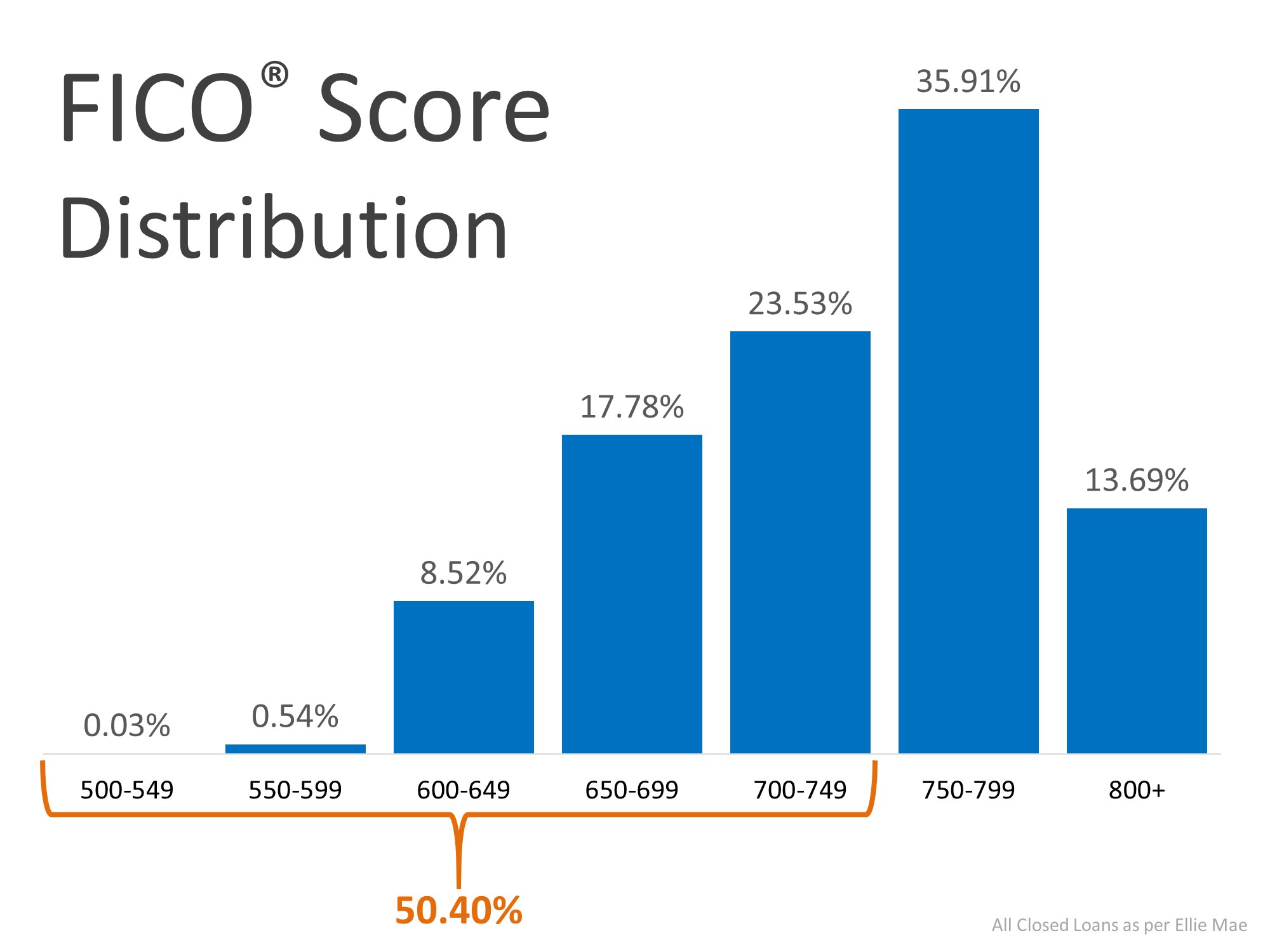 Even today, many of the myths of the home buying process are unfortunately keeping plenty of motivated buyers on the sidelines. In reality, it really doesn’t have to be that way.
Even today, many of the myths of the home buying process are unfortunately keeping plenty of motivated buyers on the sidelines. In reality, it really doesn’t have to be that way.
Bottom Line
If you’re thinking of buying a home, you may have more options than you think. Let’s connect to answer your questions and help you determine your next steps.
Yes, You Can Still Afford a Home


The residential real estate market has come roaring out of the gates in 2020. Compared to this time last year, the number of buyers looking for a home is up 20%, and the number of home sales is up almost 10%. The increase in purchasing activity has caused home price appreciation to begin reaccelerating. Many analysts have boosted their projections for price appreciation this year.
Whenever home prices begin to increase, there’s an immediate concern about how that will impact the ability Americans have to purchase a home. That thinking is understandable. We must, however, realize that price is not the only element to the affordability equation. Mark Fleming, Chief Economist at First American, recently explained:
“When demand increases for a scarce (limited or low supply) good, prices will rise faster. The difference between houses and other goods is that we buy them with a mortgage. So, it’s not the actual price that matters, but the price relative to purchasing power.”
While home prices have risen recently, mortgage interest rates have fallen rather dramatically. At the beginning of last year, the 30-year fixed-rate mortgage stood at 4.46%. Today, that number stands over a full percentage point lower.
How does a lower mortgage rate impact your monthly mortgage payment?
Michael Hyman, a research data specialist for the National Association of Realtors (NAR), explained in a recent report that, even though home values have increased over the last year, the monthly cost of owning a home has decreased:
“With lower mortgage rates compared to one year ago, the payment as a percentage of income fell to 15.5%…from 17.1% a year ago.”
When purchasing a home, the price is not as important as its cost. Today, the monthly expense (cost) of purchasing the same house you could have purchased last year would be less. Or, you could purchase a more expensive home for the same monthly expense.
Fleming, looking at all aspects of the affordability equation (prices, wages, and mortgage rates), calculated the actual numbers in a recent blog post:
“Low mortgage rates and income growth triggered a 13.5% increase in house-buying power compared with a year ago.”
Since wages have increased and mortgage rates have dropped to historically low levels, this is a great time to buy your first home or move up to the home of your dreams. As Tendayi Kapfidze, Chief Economist at LendingTree, recently advised:
“If you are in a point in your life where you’re considering buying a home today, it’s a better time to buy than 10 years ago. If you can get a mortgage, you’re getting much lower interest rates, and it enables you to afford more.”
Bottom Line
Whether you’ve considered becoming a homeowner for the first time or have decided to sell your home and buy one that better suits your current lifestyle, now is a great time to get together and discuss your options.
Equity Gain Growing in Nearly Every State


Rising home prices have been in the news a lot lately, and much of the focus is on whether they’re accelerating too quickly and how sustainable the growth in prices really is. One of the often-overlooked benefits of rising prices, however, is the impact they have on a homeowner’s equity position.
Home equity is defined as the difference between a home’s fair market value and the outstanding balance of all liens on the property. While homeowners pay down their mortgages, the amount of equity they have in their homes climbs each time the value increases.
Today, the number of homeowners that currently have significant equity in their homes is growing. According to the Census Bureau, 38% of all homes in the country are mortgage-free. In a home equity study, ATTOM Data Solutions revealed that of the 54.5 million homes with a mortgage, 26.7% of them have at least 50% equity. That number has been increasing over the last eight years.
CoreLogic also notes:
“…the average homeowner gained approximately $5,300 in equity during the past year.”
The map below shows a breakdown of the increasing equity gain across the country, painting a clear picture that home equity is growing in nearly every state.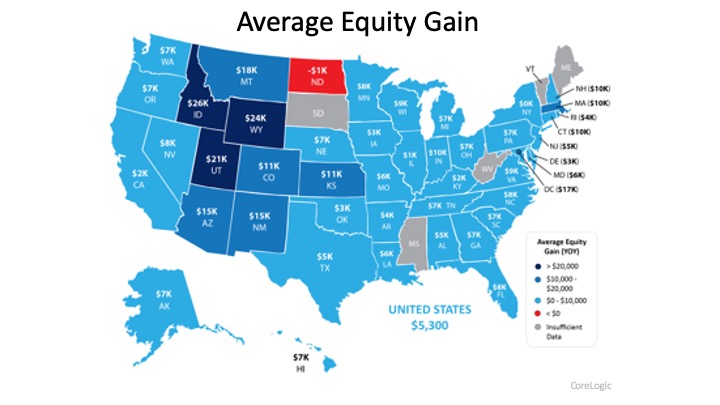
Bottom Line
This may be the year to take advantage of your home equity by applying it forward, either as you downsize or as you move up to a new home.
Confidence Is the Key to Success for Young Homebuyers


Buying your first home can seem overwhelming. Thankfully, there’s a lot of great information out there to help you feel more confident as you learn about the process. For those in younger generations who aspire to buy, here are three things to consider sooner rather than later in your journey:
1. Understand What it Takes to Purchase a Home
Overall, Millennials make up the largest group of homebuyers in today’s real estate market, and Gen Z is not too far behind. A recent study shared by Freddie Mac shows, however, that Generation Z isn’t as confident in the homebuying process as Millennials. The best thing potential young buyers can do is understand what it takes to buy a home. Learn as much as you can about the mortgage process, down payment options, and the overall steps to take along the way.
2. Realize Your Opportunity to Build Wealth
Homeownership allows you the chance to put a small portion of the home’s value down when you buy, and then watch your appreciation grow on the full value of the home – not just on the down payment. It’s one of the best investments you can make, and a form of ‘forced savings’ working in your favor over time. The added bonus? You get to live there, too.
3. Find Someone You Trust to Help You Through the Process
Having someone you trust to guide you through this process is invaluable. Finding a local real estate expert to help you navigate through the transaction and feel more confident as you make important decisions could be the best choice you make.
For Millennials and Gen Z’ers thinking about buying, today’s historically low interest rates combined with the outlook for future home appreciation is a big win. This means whatever you buy today, you’ll be bragging about 10 years from now. You can feel confident about that!
Bottom Line
If you’re ready, buying your first home sooner rather than later is one of the best decisions you can make. But there are many things to consider before taking that step, so let’s work together to help you confidently navigate the full journey.
New Homes Coming to the Housing Market This Year
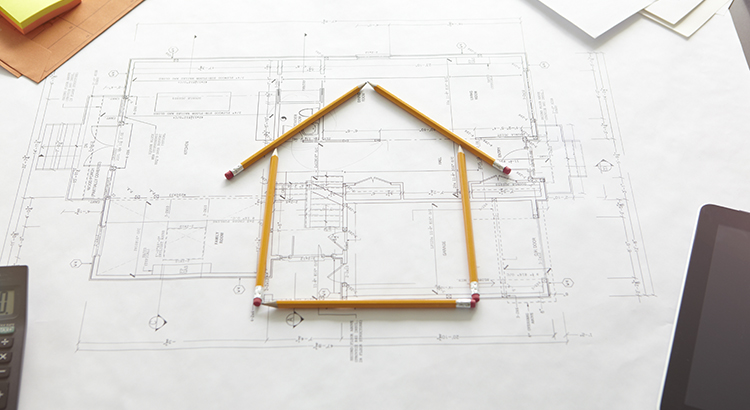

The number of building permits issued for single-family homes is the best indicator of how many newly built homes will begin to come to market over the next few months. According to the latest U.S. Census Bureau and U.S. Department of Housing & Urban Development Residential Construction Report, the number of building permits issued in January was 1,551,000. This is a 9.2% increase from December.
How will this impact buyers?
New inventory means more options. Lawrence Yun, Chief Economist at the National Association of Realtors (NAR), explained how this is good news for the housing market – especially for those looking to buy:
“More construction will mean more housing inventory for consumers in the later months of this year…Spring months could still be quite tough for buyers since it takes time to convert housing starts into actual housing completions.”
How will this impact sellers?
More inventory means more competition. Yun continues to say:
“As trade-up buyers move into these newly completed homes in the near future, their existing homes will be released onto the market.”
Today, because of the tremendous lack of inventory, a seller can potentially anticipate:
- A great sale price on their house as buyers engage in potential bidding wars.
- A quick sale as buyers have little inventory to choose from.
- Fewer hassles as buyers want to smoothly secure a contract.
Bottom Line
If you’re considering selling your house, you’ll want to list sooner rather than later. This way, you’ll get ahead of this new competition coming to market and ensure the most attention toward your listing and the best price for your house.
10 Steps to Buying a Home [INFOGRAPHIC]
![10 Steps to Buying a Home [INFOGRAPHIC] | MyKCM](https://desireestanley.com/files/2020/03/20200228-MEM-EN-1046x837.jpg)
![10 Steps to Buying a Home [INFOGRAPHIC] | MyKCM](https://files.mykcm.com/2020/02/25113646/20200228-MEM-EN-1046x837.jpg)
Some Highlights:
- If you’re thinking of buying a home and you’re not sure where to start, you’re not alone.
- Here’s a guide with 10 simple steps to follow in the homebuying process.
- Be sure to work with a trusted real estate professional to find out the specifics of what to do in your local area.
The 2 Surprising Things Homebuyers Really Want


In a market where current inventory is low, it’s normal to think buyers might be willing to give up a few desirable features in their home search in order to make finding a house a little easier. Don’t be fooled, though – there’s still an interest in the market for some key upgrades. Here’s a look at the two surprising things buyers seem to be searching for in today’s market, and how they’re impacting new home builds.
Homebuyers Are Not Giving Up Their Garages
The National Association of Home Builders (NAHB) recently released an article showing the percentage of new single-family homes completed in 2018. The data reveals,
- 64% of new homes offer a 2-car garage
- 21% have a garage large enough to hold 3 or more cars
- 7% have a 1-car garage
- 7% do not include a garage or carport
- 1% have a carport
The following map represents this breakdown by region: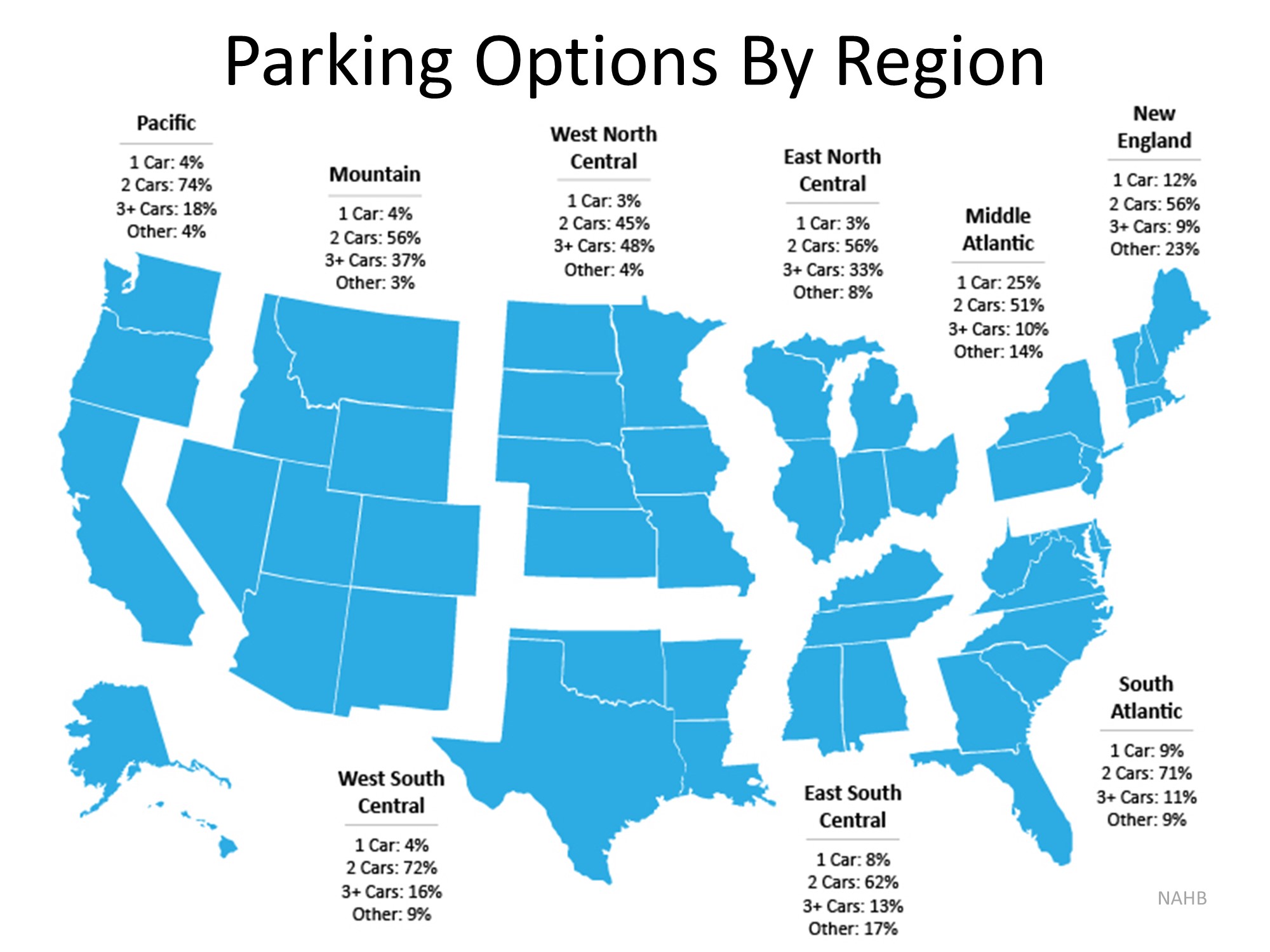 Evidently, a garage is something homebuyers are looking for in their searches, but that’s not all.
Evidently, a garage is something homebuyers are looking for in their searches, but that’s not all.
Homebuyers Are Not Giving Up Their Patios
Patios are on the radar for buyers as well. Community areas are often common amenities in new neighborhoods, but as it turns out, private outdoor spaces are quite desirable too. NAHB also found that,
“Of the roughly 876,000 single-family homes started in 2018, 59.4% came with patios…This is the highest the number has been since NAHB began tracking the series in 2005.”
As shown in the graph below, the number of new homes built with patios has been increasing for the past 9 years. Clearly, they’re a desirable feature for new homeowners too.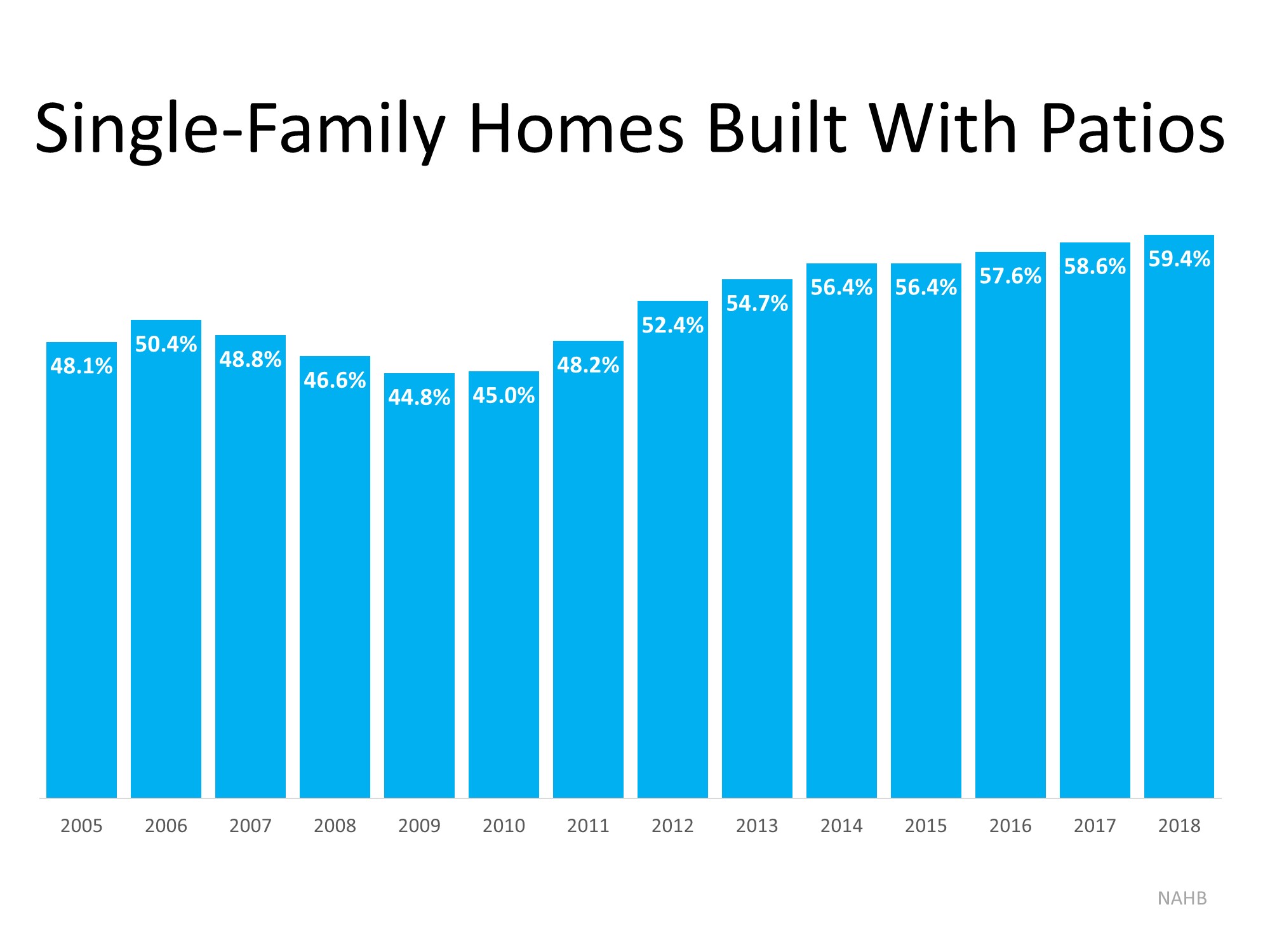
Bottom Line
Homebuyers are looking for garage space and outdoor patio living. If you’re a homeowner thinking of selling a house with these amenities, it appears buyers are willing to spring for those key features. Let’s get together today to determine the current value and demand for your home.


 Facebook
Facebook
 X
X
 Pinterest
Pinterest
 Copy Link
Copy Link